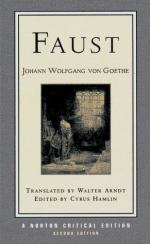TRANSLATOR’S PREFACE.
Perhaps some apology ought to be given to English scholars, that is, those who do not know German, (to those, at least, who do not know what sort of a thing Faust is in the original,) for offering another translation to the public, of a poem which has been already translated, not only in a literal prose form, but also, twenty or thirty times, in metre, and sometimes with great spirit, beauty, and power.
The author of the present version, then, has no knowledge that a rendering of this wonderful poem into the exact and ever-changing metre of the original has, until now, been so much as attempted. To name only one defect, the very best versions which he has seen neglect to follow the exquisite artist in the evidently planned and orderly intermixing of male and female rhymes, i.e. rhymes which fall on the last syllable and those which fall on the last but one. Now, every careful student of the versification of Faust must feel and see that Goethe did not intersperse the one kind of rhyme with the other, at random, as those translators do; who, also, give the female rhyme (on which the vivacity of dialogue and description often so much depends,) in so small a proportion.
A similar criticism might be made of their liberty in neglecting Goethe’s method of alternating different measures with each other.
It seems as if, in respect to metre, at least, they had asked themselves, how would Goethe have written or shaped this in English, had that been his native language, instead of seeking con amore (and con fidelita) as they should have done, to reproduce, both in spirit and in form, the movement, so free and yet orderly, of the singularly endowed and accomplished poet whom they undertook to represent.
As to the objections which Hayward and some of his reviewers have instituted in advance against the possibility of a good and faithful metrical translation of a poem like Faust, they seem to the present translator full of paradox and sophistry. For instance, take this assertion of one of the reviewers: “The sacred and mysterious union of thought with verse, twin-born and immortally wedded from the moment of their common birth, can never be understood by those who desire verse translations of good poetry.” If the last part of this statement had read “by those who can be contented with prose translations of good poetry,” the position would have been nearer the truth. This much we might well admit, that, if the alternative were either to have a poem like Faust in a metre different and glaringly different from the original, or to have it in simple and strong prose, then the latter alternative would be the one every tasteful and feeling scholar would prefer; but surely to every one who can read the original or wants to know how this great song sung itself (as Carlyle says) out of Goethe’s soul, a mere prose rendering must be, comparatively, a corpus mortuum.




